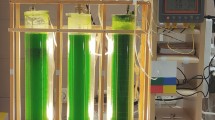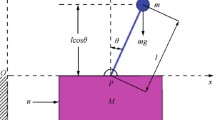Abstract
Controller design for an isotope separation column is recognized as a difficult and challenging problem. The dynamics of the isotope separation process is difficult to model precisely using integer order transfer functions; thus, a fractional order approach is preferred. The objective of this work is to design two different PI controllers—a classical one and a fractional order one—and test their closed loop performance under nominal conditions as well as gain uncertainties. Since the process is represented by a fractional order mathematical model, the simplest approach to design both controllers is based on a frequency specification. For the fractional order of the PI controller and its parameters, the authors solve a system of equations that includes a robust performance specification to gain uncertainties. For the classical PI controller, a traditional tuning algorithm based on phase margin specification is implemented. The simulation results show that both controllers meet the design specifications, with the fractional order PI controller behaving more robustly to plant gain variations.
Similar content being viewed by others
References
Dulf, E.-H., Festila, C., Dulf, F.-V., Pop, C.-I., Both, R.: Fractional order controller design for 13C separation column. In: 19th Mediterranean Conference on Control & Automation (MED), Corfu (2011). doi:10.1109/MED.2011.5983150
Podlubny I.: Fractional Differential Equations. Academic Press, San Diego (1999)
Podlubny I.: Fractional order systems and PIλ Dμ controllers. In: IEEE Trans. Autom. Control 44, 208–214 (1999)
Maione G., Lino P.: New tuning rules for fractional PIα controllers. Nonlinear Dyn. 49, 251–257 (2007)
Zhao, C., Xue, D., Chen, Y.: A fractional order PID tuning algorithm for a class of fractional order plants. In: Proceedings of the IEEE International Conference on Mechatronics & Automation, Ontario (2005). doi:10.1109/ICMA.2005.1626550
Manabe S.: The non-integer integral and its application to control Systems. Electrotechn. J. Jpn. 6, 83–87 (1961)
Barbosa, R.S., Machado, J.A.T., Ferreira, I.M.: A fractional calculus perspective of PID tuning. In: Proceedings of the DETC’03, Chicago (2003). doi:10.1115/DETC2003/VIB-48375
Oustaloup, A., Sabatier, J., Lanusse, P., Malti, R., Melchior, P., Moreau, X., Moze, M.: An overview of the CRONE approach in system analysis, modeling and identification, observation and control. In: Proceedings of the 17th World Congress The International Federation of Automatic Control, pp. 14254–14265. Seoul (2008)
Vinagre, B.M., Podlubny, I., Dorcak, L., Feliu, V.: On fractional PID controllers: a frequency domain approach. In: Proceedings of IFAC Workshop on Digital Control. Past, Present and Future of PID Control, pp. 53–58. Terrasa (2000)
Caponetto, R., Fortuna, L., Porto, D.: Parameter tuning of a non-integer order PID controller. In: Proceedings of the Fifteenth International Symposium on Mathematical Theory of Networks and Systems, Notre Dame (2002). http://www.nd.edu/mtns/papers/7434.pdf
Leu J.F., Tsay S.Y., Hwang C.: Design of optimal fractional-order PID controllers. J. Chin. Inst. Chem. Eng. 33, 193–202 (2002)
Dulf, E.H., Both, R., Dumitrache, D.C.: Fractional order models for a cryogenic separation column. In: Proceedings of the IEEE International Conference on Automation, Quality and Testing, Robotics (AQTR), Cluj-Napoca (2010). doi:10.1109/AQTR.2010.5520895
Monje C.A., Vinagre B.M, Chen Y., Feliu V.: On fractional PIλ controllers: some tuning rules for robustness to plant uncertainties. Nonlinear Dyn. 38, 369–381 (2004)
Cohen K.: The Theory of Isotope Separation as Applied to the Large-Scale Production of U235. McGraw-Hill Book Company, Inc, New York (1951)
London H.: Separation of Isotopes. George Newnes Limited, London (1961)
Dulf, E.-H., Unguresan, L.M., Gligan, M., Festila, C:. Operational models of the cryogenic distillation column for (13C) isotope. In: Proceedings of International IEEE-TTTC International Conference on Automation, Quality and Testing, Robotics, Cluj-Napoca (2006). doi:10.1109/AQTR.2006.254517
Axente, D., Abrudean, M., Baldea, A.: Isotope Separation 15N, 18O, 10B, 13C by isotopic exchange, in Romanian, Casa Cartii de Stiinta, Cluj-Napoca (1994)
Ljung L.: System Identification: Theory for the User. Prentice-Hall, Englewood Cliffs (1987)
Abonyi, J. Babuska, R.: Local and global identification and interpretation of parameters in Takagi-Sugeno fuzzy models. In: Proceedings of the IEEE International Conference on Fuzzy Systems, San Antonio (2000)
Merrikh-Bayat F.: Rules for selecting the parameters of Oustaloup recursive approximation for the simulation of linear feedback systems containing PIλDμ controller. Commun. Nonlinear Sci. Numer. Simul. 17, 1852–1861 (2012)
Author information
Authors and Affiliations
Corresponding author
Rights and permissions
About this article
Cite this article
Dulf, EH., Pop, CI. & Dulf, FV. Fractional calculus in 13C separation column control. SIViP 6, 479–485 (2012). https://doi.org/10.1007/s11760-012-0335-z
Received:
Revised:
Accepted:
Published:
Issue Date:
DOI: https://doi.org/10.1007/s11760-012-0335-z




